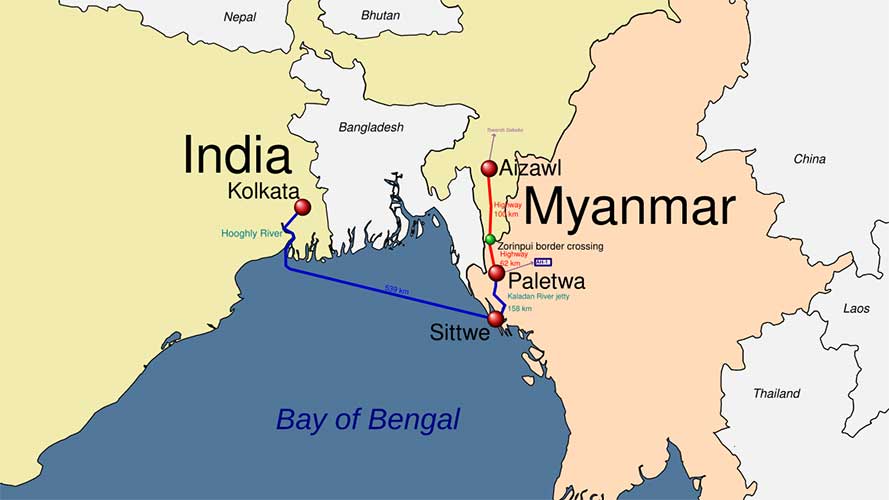Amid all troubles following an unstable situation in Myanmar/ Burma/Brahmadesh), India is looking at commissioning the ambitious Kaladan riverine project connecting a port in Rakhine/Arakan State with the land-locked north-eastern States for regular trading. Agreed officially between New Delhi and Naypietaw (earlier Rangoon) in 2008, the Kaladan Multi-Modal Transit Transport Corridor Project was initiated under India’s then Look East Policy and later revamped as Act East Policy. Sittwe port in the Bay of Bengal is supposed to receive shipment from Kolkata, Chennai and other international ports and then it will be sailed through Kaladan river to Paletwa in Chin State of Myanmar. Then the goods will be shifted to land routes and transited to Zorinpui in Mizoram border (finally to connect other important localities in eastern India with National Highway 54).
However, the project now faces hurdles from the security challenges due to the changing political situation and lately surfaced a civil war like situation in the southeast Asian country. Even though modernization of Sittwe port and Paletwa jetty were already completed, the Paletwa- Zorinpui highway (around 100 kilometer) remains under construction. Initially planned to launch by 2014, the project with a budget of Rs 536 crore in 2008 (work started in 2010) now crosses Rs 3,200 crore because of perennial delays and missed another deadline in 2023. New dateline is set for July 2025, even though it will be difficult to get it realized unless the Union government in New Delhi comfortably deals with the powerful ethnic armed group Arakan Army, which had recently captured Paletwa after defeating the ruling military junta. Sittwe, the capital of Arakan State, however remains under full control of the military dictators, even though the port city continues facing offensives from the anti-junta armed fighters.
Not only Rakhine and Chin States, the entire country is now witnessing a chaotic situation, where the military junta starts losing their territories in the last few months to the resistant forces supported by many common Burmese nationals with arms on their hands. Currently the Min Aung Hlaing led junta forces hardly control 30% of Myanmar townships, where 25% slips into full conflict zones. The junta has lost 173 military battalion headquarters including two regional military commands, six command headquarters and six strategic military bases as well as 742 frontline outposts to the revolutionary fighters. Moreover, the armed militias have brought under control the important routes connecting the border towns with Bangladesh, India, Thailand and China. The Arakan Army fighters have captured 15 out of 17 townships with a large number of military bases including the junta’s strategic Western Command headquarters in Ann locality.
North-east shares an international border of 1,643 km with Myanmar and the border remains mostly porous, which has been used by the insurgents and smugglers since long back to put the region in a volatile situation from time and again. So New Delhi has eventually had to engage with both the junta and rebel groups with an aim to propagate the India-supported missions. Recently, some Burmese ethnic groups were even invited to New Delhi for preliminary interactions so that the relation with them improves. The meeting with Arakan Army representatives was reported as productive. Another round of discussions initiated by India’s foreign ministry officials was organized in Bangkok. Indian Ambassador in Yangon Abhay Thakur along with other responsible officials visited Sittwe on 16-17 January and reviewed ongoing operations at the port. The junta-sponsored newspaper Global New Light of Myanmar reported that since its inauguration on 4 May 2023, Sittwe port has managed over 150 cargo vessels, primarily carrying food items, agriculture commodities, medicines, machinery parts, construction materials, fuel, etc. Ambassador Thakur also met with Rakhine State chief minister U Htein Lin and discussed the matters related to bilateral development cooperation, capacity building and humanitarian assistance. Thakur highlighted the importance of an early return to peace and stability, which would pave the way for exploiting the full potential of the Kaladan project.
Until the dust settles in western Myanmar, it seems to be difficult to complete and commission the Kaladan project and till then the land-locked region along with its beneficiaries needs to wait for the golden moment.
Nava Thakuria is a senior journalist based in Assam and his focus areas remain the eastern part of Bharat along with Nepal, Bhutan, Tibet (China), Myanmar and Bangladesh.
